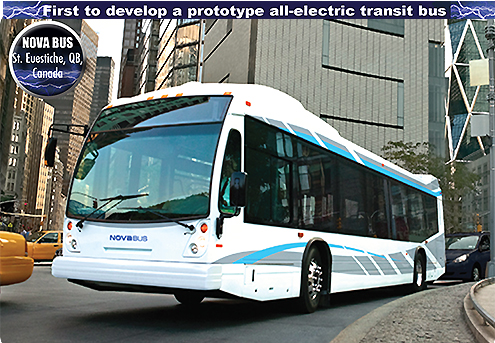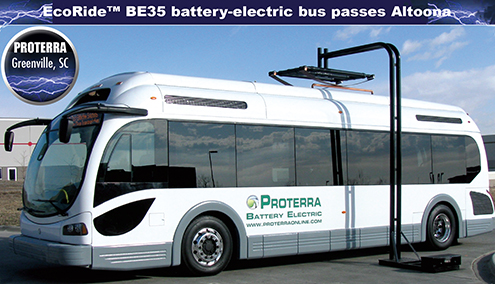
DesignLine, a manufacturer of environmentally-friendly transit buses, unveiled its first all-electric bus in 2007.
The Eco-Smart 1 is completely emission free and light on maintenance. The company reports its electric bus is capable of operating up to 120 miles on a single charge under high-density, stop-and-go, urban transit route conditions.
The Eco-Smart 1 incorporates the same drivetrain and other key configurations as the hybrid-electric EcoSaver. The company notes the primary technical difference between the electric bus and the EcoSaver IV is the replacement of the auxiliary power unit (APU) with additional battery packs.
DesignLine says while the purchase price is approximately $600,000 to $700,000 higher than a comparably-equipped standard diesel bus, it does promise a 10 percent savings in fuel costs and certain other operating costs over the life of the vehicle.

In conjunction with its North American partners and the Volvo Group, Nova Bus stepped up its Electro Mobility strategy in 2011 to develop a fully electric transit bus.
Unveiled in 2011, Nova Bus lays claim to being the first established bus maker to present such a prototype all-electric vehicle.
The Quebec government is investing $30 million in the $73-million public-private project to develop electric buses for the international public transit market.
According to a statement from Quebec Premier, the intent of funding is to become an innovation leader in the burgeoning global electric-vehicle industry.
Along with Nova Bus, the non-profit organization, Consortium Bus Électrique, a clutch of Quebec companies includes lithium battery firm Bathium Canada; electric vehicle component maker TM4; software firm Giro, manufacturing firm René Matériaux Composites; and engineering company Précicad. The goal is to put a demo vehicle in service in coming years.

Proterra specializes in the manufacture of 100 percent battery-electric zero-emission commercial transit buses, with more than 80 percent of the components sourced within the United States from 33 states. Proterra, Inc. recently added San Antonio, TX to its list of service cities.
The new three-bus battery-electric fleet, the Arc, went into service in February. The company says its 35-ft EcoRide™ BE35 made of lightweight composite materials is the first heavy-duty electric transit bus ever to pass Altoona bus testing conducted through the Larson Institute at Pennsylvania State University. The Federal Transit Administration mandates an analysis of all new model buses purchased with federal funds to ensure reliability and in-service performance. The Altoona test simulates the use and strain a bus will undergo during its 12-year durable life cycle. Proterra says the 54-72 kWh lithium-titanate battery packs recharge in less than 10 minutes.

New Flyer Industries and its consortium partners received CAD $3.4 million in funding through Sustainable Development Technology Canada (SDTC) in 2012 to further enhance rapid-charge battery-electric bus propulsion technology. The consortium partners contributing to this innovative vehicle include, the Government of Manitoba, Mitsubishi Heavy Industries, Ltd. (MHI), Manitoba Hydro, Red River College and Winnipeg Transit.
The SDTC project involves the development and implementation of four rapid-charge battery-electric transit buses and a high capacity charging station.
Based on its highly successful 40-foot Xcelsior heavy-duty transit bus, New Flyer has modified battery-electric prototype to integrate advanced lithium ion batteries from MHI that charge from the utility electrical grid as opposed to electrical power from a conventional diesel engine.
These buses are targeted for delivery to Winnipeg Transit in 4Q 2013 for revenue service over a four-year period.
This project will examine the integration of electric vehicle technology into transit service and evaluate key operational performance characteristics including the charging system, battery capacity, component life, reliability and the assessment of both operational and life cycle cost savings.
No comments:
Post a Comment